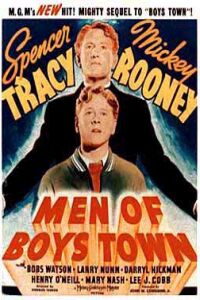
MEN OF BOYS TOWN
US, 1941, 106 minutes, Black and white.
Spencer Tracy, Mickey Rooney, Bobs Watson, Larry Nunn, Darryl Hickman, Henry O’ Neill, Mary Nash, Lee J. Cobb.
Directed by Norman Taurog.
Men of Boys Town is a follow-up to the immensely popular Boys Town of 1938. The film told the true story of Father Edward Flanagan, who established a Boys Town, and who always believed that every boy had a good heart. It was an Oscar-winning performance by Spencer Tracy (who had won the Oscar the previous year for Captains Courageous).
The Boys Town story was an inspiring one especially for the 1930s. There had not been so many priests on screen during the 1930s but Spencer Tracy embodied the priest from San Francisco to Boys Town (and was to appear as a priest also in The Devil at Four O’ Clock in 1962). The other image of the priest was given by Pat O’ Brien in the gangster films from Warner Brothers with James Cagney.
Mickey Rooney, still looking very young, appears as a teenager who gets caught up with a friend who is a thief – and both are sent to Boys Town. However, the Maitland family have adopted him as a friend for their disabled son. The film has some melodramatic difficulties with regards to the two boys, their rehabilitation at Boys Town. Eventually, all is well as Father Flanagan wields his charm and his skills with the boys and the debts for Boys Town are repaid. Direction is by Norman Taurog who had won an Oscar early in the 1930s for Skippy and who was to direct a lot of popular entertainments, especially for Martin and Lewis.
1.The implication of growth in the title – and in Father Flanagan’s speech at the end?
2.Impressions of Boys Town? How good an institution in itself? Why were two hundred and fifty more Boys Towns needed? What values were preserved in the Boys Towns? How did the boys respond? The need for Boys Towns?
3.The 1940s style of the film? The picture of the United States, of American youth, of American gangster influence, reform schools? How sentimental in its picture of America? The presentation of Peewee?
4.What kind of man was Father Flanagan? A good priest, a practical man? An idealist and a dreamer? What motivated him? What influence did he have on the boys? Why did they respond to him? How could he influence the future of these boys? Which sequences best illustrated his relationship with the boys? His relationship with the board? With Dave Morris? How strong a sense of failure did he have at the end? Had he failed just because he had no money?
5.Was Whitey an attractive character? How had Boys Town changed him? What influence did he have in Boys Town? Why did he not want to be adopted? Did he try his best? Why did he go with Flip? Did this seem to contrive to get him into the reform school?
6.What kind of people were the Maitlands? Were they genuinely interested in Whitey? Did they understand him?
7.How important was Ted? The court case? His hitting of the warder? The picture of Marysport and the reform school? Did this seem farfetched? Whitey’s experience in balancing what Ted said? His need for faith in people?
8.How did the police help Ted? Their effort for the concert? Peewee’s influence on Ted? The dog?
9.The operation, Father Flanagan’s absence? The effect of the dog’s funeral?
10.The importance of Flip in the film – how had reform school hardened him?
11.Father Flanagan’s work in reforming the reform school? How effective? His speech?
12.How preaching was the film? Noble and sentimental? Do films like this really move audiences? The emotional impact at the end of the film? About Boys Town and such institutions and such people as Father Flanagan?